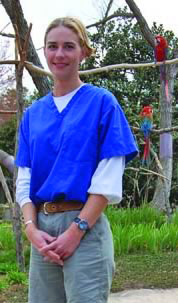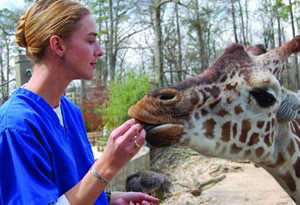Where the Wild Things Are: College of Ag Alum Finds Ultimate Job as Zoo Veterinarian
By: Jamie Creamer

Rush at the Birmingham Zoo
As child growing up in Alabama's Clay County, Marie Rush always dreamed of someday being, not just a veterinarian, but a zoo veterinarian. And not just at any zoo, but at the Birmingham Zoo.
She admits she almost has to pinch herself these days, to make sure she isn't still dreaming.
She's been at that job for two years now, and on a scale of one to 10, she'd have to rate her job satisfaction level at a good 20.
"I absolutely love what I do," the 1995 Auburn University animal sciences major says as she maneuvers a golf cart down a graveled path on her rounds at the Birmingham Zoo. "Every day-every hour-is an adventure. In this job, the one thing I know for sure is that I can expect the unexpected."
Take this particular morning, for instance. She came in bright and early with a jam-packed schedule, but a geriatric bird needed emergency attention, as did a lorikeet that had wound up on the losing end of a battle with his cage mates, and then there was the hippo that had somehow cut her foot-and all of that before Rush had finished her first cup of coffee.
"We run as hard as we can all the time," a high-energy Rush says of the zoo's medical team, which also includes an associate vet, a hospital keeper and two technicians, one paid and one volunteer.
It's a good thing she loves her job, because as director of veterinary services at a zoo with 763 animals, Rush's is a highly demanding position. Her typical week runs Sundays through Thursdays. She puts in 10- to 12-hour days at the zoo and then a couple or three hours most nights at home, studying.
"There's always some species or some new problem or new drug or new research-always something that I don't know but that I need to know to provide these animals with the best care possible," Rush says.
"This zoo has entrusted me with the care of these animals, and I take that very seriously."
Here's an example of how seriously. In 2004, highly concerned over the declining health of the zoo's 400-pound male gorilla, Babec, Rush quickly put together a team of extremely qualified medical professionals who volunteered their expertise, time and equipment to determine what the problem was-advanced congestive heart failure-and then perform the unprecedented move of implanting a cardiac resynchronization therapy device in a gorilla.
The Powerade-drinking Babec was then and still remains the only primate in the world with such a device.
"The CRT doesn't repair the damage that's been done or cure his disease, but it has immensely improved his quality of life, and that was the goal of the implant," Rush says.
Zoo medicine was almost a natural career choice for Rush, the daughter of a physician father and zoologist mother, and granddaughter of the late Earl Kennamer, long-time Alabama Extension wildlife specialist.
"I get to practice medicine like my dad and work with wildlife like my mom and granddad," she says. "How lucky is that?
"When I was 2 and 3 years old, I was saying I wanted to doctor the animals at the zoo," Rush says. "That never changed."
Just as she always knew she would be a veterinarian, so Rush was always certain that, one, she would attend Auburn University and, two, she would do her pre-vet studies in the College of Agriculture's animal sciences department.
"I grew up on an Angus farm and showed cattle for 18 years of my life," the 32-year-old Rush says. "Animal science was where my roots were."
She has nothing but praise for the department's pre-vet track.
"As opposed to other pre-vet majors, in animal sciences, you get didactics and hands-on experience," she says. "You have to learn it and use it, and to me that gives students a leg up when they get into vet school.
"And in my job here at the zoo, every single protocol I learned-whether it was in soils or animal nutrition or physiology-comes into play nearly every day."
Rush graduated magna cum laude with her animal sciences degree in 1995, and handily earned early admission to AU's College of Veterinary Medicine, graduating from there summa cum laude in 1998. The small-town Alabama girl then moved to New York, where she did a one-year internship in surgery at the Animal Medical Center in Manhattan, the largest small-animal hospital in the world.
"My strength was always in large animals because of my background, so it was important that I get that (small-animal) experience," Rush says. "Plus, they have an extremely good exotics rotation there."
She followed that internship with a residency in clinical zoo and wildlife medicine at the Wildlife Conservation Society's Bronx Zoo.
With that experience under her belt, she returned home and began practicing veterinary medicine as both an exotic-species consultant to private practitioners and a part-time associate veterinarian at Cheaha Animal Hospital in Oxford.
She was working as a consultant to the Birmingham Zoo when the chief veterinarian's post became available. Following a nationwide search, the zoo hired the best person for the job-an absolutely thrilled Marie Rush.
"I'm very close to my family, so staying near them has always been a priority for me," Rush says. "That's why I'd always had my sights set on someday being the vet here, at the Birmingham Zoo. I just feel very privileged that the opportunity came my way so soon in my career."
And, no, she doesn't worry that she's already reached her career goal, that things will be anticlimactic from here. In fact, she believes she's got her work cut out for her.
"We're growing by leaps and bounds here, and my plan is to be here and grow with the institution," Rush says.

Marie Rush gives Juno the giraffe a treat.
When Rush isn't at work, she's, well, she's at work. Believe it or not, she spends most every Friday off seeing patients all day back at Cheaha Animal Hospital. But actually, she says, she doesn't count that as "working."
"My work on Fridays is almost like a day off, because it's nothing like what I do all week," she says. "There (at Cheaha), I'm working with domestic animals, mostly dogs and cats, doing checkups and spays and fixing broken legs and procedures like that, things that keep me on my toes."
Rush does have a four-legged mental-health therapist named Mona, the 58-year-old matriarch of the pachyderm exhibit at the Birmingham Zoo, a powerful lady who has been there since shortly after the zoo opened back in 1955.
"Mona is truly an amazing animal who reminds me what an incredible job I have," Rush says of the four-ton elephant.
"Quite honestly, though, I can say this about almost every animal in the zoo, to some degree," she says. "Each one reminds me how fortunate and blessed I am to be in this business."
